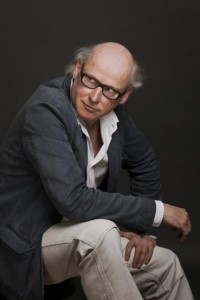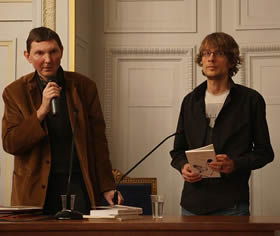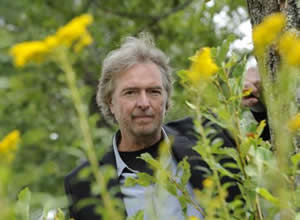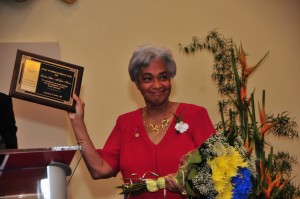|
De Nederlandse schrijver Oek de Jong werd geboren in Breda op 4 oktober 1952. Zie ook mijn blog van 4 oktober 2010 en eveneens alle tags voor Oek de Jong op dit blog.
Uit: Een rij handkarren
Breitner is er vroeg voor opgestaan, zoals hij wel vaker doet wanneer hij in de stad wil fotograferen. Hij houdt van de drukte en beweging in de Amsterdamse straten, maar ook van de ochtendstilte, de lange schaduwen die een nog laagstaande zon werpt, van roerloos water waarin zich de huizen weerspiegelen. Het is ook handig om in alle vroegte te fotograferen: er zijn nog maar weinig mensen op straat, zodat hij zijn stadsgezichten met figuren gemakkelijker kan componeren.
Hij loopt van zijn huis aan de Lauriergracht naar de Wallen en daar zoekt hij zijn weg naar de plek die hij al een tijd in zijn gedachten heeft: een bocht in de Oudezijds Achterburgwal. In de stegen weerklinken zijn voetstappen. Ergens wordt een raam omhoog geschoven. Uit een kelderwoning klinkt kindergekrijs. In een halfdonker café staan de stoelen op de tafels. De bedompte geur van bier en afval mengt zich met de frisse lucht.
Daar gaat Breitner met zijn zwarte bolhoed en zijn camera. Hij is nog geen veertig. Hij ademt. Hij huivert misschien even in de ochtendkilte na te weinig slaap. De ijle schaduwen van bomen, gaslantaarns en brugleuningen glijden over hem heen. Wanneer hij een brug afloopt schuiven zijn voeten in zijn schoenen naar voren, tegen het leer aan.
Nog een steeg, dan is hij ter plaatse en ligt rechts van hem de Oudezijds Achterburgwal. Er zijn toch een paar mensen op de kade. Hij maakt er gebruik van, impulsief als hij is. Hij kiest meteen zijn standpunt, volgt in de zoeker van de camera de bewegingen van zijn figuren en drukt dan af. Uit de camera komt een zacht geluid van werkend mechaniek.
Meer dan honderd jaar later zie je op de foto die bocht in de Oudezijds Achterburgwal. De zon staat nog laag en beschijnt de achtergevels van de huizen aan de Zeedijk. Ruiten blinken. Overal hangt wasgoed buiten de ramen, het heeft daar de hele nacht gehangen, boven de gracht. De houten steunen van lege waslijnen werpen lange, schuinse schaduwen op de gevels. Het is pril licht dat op de oude huizen valt.

Oek de Jong (Breda, 4 oktober 1952)
De Franse dichter en schrijver Matthieu Gosztola werd geboren op 4 oktober 1981 in Le Mans (Sarthe). Zie ook mijn blog van 4 oktober 2010 en alle tags voor Matthieu Gosztola op dit blog.
Uit: Débris de tuer (Rwanda, 1994)
Alors on démarre lécoute
un an
avant la fin de la fin
on na pas de théorie
sur le chemin
ils entendaient communiquer à la radio-Télévision
libre des Mille-Collines mais ça na pas duré
ils se sont mis muhere iruhande
à lancer des branches
sur la saison en cours
Et le présent de justesse
Parce que lavenir a déjà mangé
Uit: Une caresse pieds nus
Nos caresses changent le papier peint
Des pièces où nous faisons l'amour
*
La lumière démise
Dans une caresse
La lumière se dévide dans nos caresses
Nos caresses font de chaque instant
La plus haute syllabe de lété
*
Fulgurance dune caresse
Portant la nuit à notre oreille

Matthieu Gosztola (Le Mans, 4 oktober 1981)
Hier met collega dichter en vertaler Pierre Drogi (links)
De Amerikaanse schrijver Charles Frazier werd geboren op 4 oktober 1950 in Asheville, North Carolina. Zie ook mijn blog van 4 oktober 2010 en alle tags voor Charles Frazier op dit blog.
Uit: Cold Mountain
At the first gesture of morning, flies began stirring. Inman's eyes and the long wound at his neck drew them, and the sound of their wings and the touch of their feet were soon more potent than a yardful of roosters in rousing a man to wake. So he came to yet one more day in the hospital ward. He flapped the flies away with his hands and looked across the foot of his bed to an open triple-hung window. Ordinarily he could see to the red road and the oak tree and the low brick wall. And beyond them to a sweep of fields and flat piney woods that stretched to the western horizon. The view was a long one for the flatlands, the hospital having been built on the only swell within eyeshot. But it was too early yet for a vista. The window might as well have been painted grey.
Had it not been too dim, Inman would have read to pass the time until breakfast, for the book he was reading had the effect of settling his mind. But he had burned up the last of his own candles reading to bring sleep the night before, and lamp oil was too scarce to be striking the hospital's lights for mere diversion. So he rose and dressed and sat in a ladderback chair, putting the gloomy room of beds and their broken occupants behind him. He flapped again at the flies and looked out the window at the first smear of foggy dawn and waited for the world to begin shaping up outside.
The window was tall as a door, and he had imagined many times that it would open onto some other place and let him walk through and be there. During his first weeks in the hospital, he had been hardly able to move his head, and all that kept his mind occupied had been watching out the window and picturing the old green places he recollected from home. Childhood places.
The damp creek bank where Indian pipes grew. The corner of a meadow favored by brown-and-black caterpillars in the fall. A hickory limb that overhung the lane, and from which he often watched his father driving cows down to the barn at dusk.

Charles Frazier (Asheville, 4 oktober 1950)
De Surinaamse schrijfster Cynthia Henri Mc Leod werd geboren op 4 oktober 1936 in Paramaribo als Cynthia Ferrier. Zie ook mijn blog van 4 oktober 2010 en eveneens alle tags voor Cynthia Mc Leod op dit blog.
Uit: The Free Negress Elisabeth (Vertaald door Brian Doyle)
1 December 1750
Elisabeth sat in her carriage as it lumbered, creaked and squeaked its way along the Heerenstraat. She inhaled the scent of the orange blossoms planted along both sides of the street and brushed a couple of tiny white flowers from her blue dress.
Men and women, the occasional couple, all of them followed by groups of male and female slaves, made their way to the Dutch Reformed Church on the other side of Oranjetuin cemetery. All the slaves were well-dressed; the women in starched and colourful baggy dresses, short smock jackets, ankle bands, bracelets and brightly coloured necklaces, the men in trousers and short jackets, the indispensable Sunday hat, but none of them wore shoes. They held parasols on long poles above their masters and mistresses heads and carried trays with prayer books wrapped in gold braided velvet on the palms of their hands. A few of the slaves held hands with a white or light brown child or carried such a child on their arm.
Although Elisabeths house was not far from the church, she always took her carriage. She passed the procession of people and nodded on occasion when someone greeted her. The carriage stopped in front of the church, a large white wooden construction in which the Police Council and the Council of Criminal Justice met during the week on the ground floor and church services were held on the upper floor on Sundays. It was the custom to have services in the morning in Dutch and in the afternoon in French, but on this occasion, the Walloon minister, Duvoisin, was presiding at the morning service because the Reverend IJver was sick in bed.
Elisabeth stepped down from her carriage, assisted by Present and Venis who had followed on foot. Venis made slight adjustments to her mistresss dress and presented her with a silver tray bearing a prayer book wrapped in purple velvet. Venis also tried to brush a lock of hair from her mistresss wig out of sight, but Elisabeth stopped her and muttered: Leave it. She slowly ascended the stairs and entered the church.

Cynthia Mc Leod (Paramaribo, 4 oktober 1936)
Zie voor nog meer schrijvers van de 4e oktober ook mijn blog van 4 oktober 2011 deel 1 en eveneens deel 2.
04-10-2012 om 20:00
geschreven door Romenu 
Tags:Oek de Jong, Matthieu Gosztola, Charles Frazier, Cynthia Mc Leod, Romenu
|

